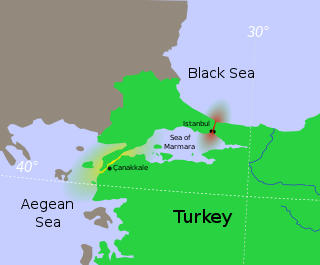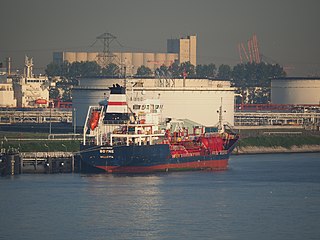
The Bosporus or Bosphorus Strait is a natural strait and an internationally significant waterway located in Istanbul in northwestern Turkey that connects the Black Sea to the Sea of Marmara. It forms part of the continental boundary between Asia and Europe, and divides Turkey by separating Anatolia from Thrace. It is the world's narrowest strait used for international navigation.

The Kerch Strait is a strait in Eastern Europe. It connects the Black Sea and the Sea of Azov, separating the Kerch Peninsula of Crimea in the west from the Taman Peninsula of Russia's Krasnodar Krai in the east. The strait is 3.1 kilometres (1.9 mi) to 15 kilometres (9.3 mi) wide and up to 18 metres (59 ft) deep. The most important harbor, the Crimean city of Kerch, gives its name to the strait, formerly known as the Cimmerian Bosporus. It has also been called the Straits of Yenikale after the Yeni-Kale fortress in Kerch.

The Exxon Valdez was an oil tanker that gained notoriety after running aground in Prince William Sound, spilling its cargo of crude oil into the sea. On 24 March 1989, while owned by the former Exxon Shipping Company, captained by Joseph Hazelwood and First Mate James Kunkel, and bound for Long Beach, California, the vessel ran aground on the Bligh Reef, resulting in the second largest oil spill in United States history. The size of the spill is estimated to have been 40,900 to 120,000 m3. In 1989, the Exxon Valdez oil spill was listed as the 54th-largest spill in history.

A cargo ship or freighter is a merchant ship that carries cargo, goods, and materials from one port to another. Thousands of cargo carriers ply the world's seas and oceans each year, handling the bulk of international trade. Cargo ships are usually specially designed for the task, often being equipped with cranes and other mechanisms to load and unload, and come in all sizes. Today, they are almost always built of welded steel, and with some exceptions generally have a life expectancy of 25 to 30 years before being scrapped.

A merchant ship, merchant vessel, trading vessel, or merchantman is a watercraft that transports cargo or carries passengers for hire. This is in contrast to pleasure craft, which are used for personal recreation, and naval ships, which are used for military purposes.

The Turkish straits are two internationally significant waterways in northwestern Turkey. The straits create a series of international passages that connect the Aegean and Mediterranean seas to the Black Sea. They consist of the Dardanelles and the Bosphorus. The straits are on opposite ends of the Sea of Marmara. The straits and the Sea of Marmara are part of the sovereign sea territory of Turkey and subject to the regime of internal waters.

The Port of Haydarpaşa, also known as the Port of Haidar Pasha or the Port of Istanbul, is a general cargo seaport, ro-ro and container terminal, situated in Haydarpaşa, Istanbul, Turkey at the southern entrance to the Bosphorus, near Haydarpaşa Station. It is operated by the Turkish State Railways (TCDD) and serves a hinterland which includes the country's most industrialised areas.
MT Independența ("Independence") was a large Romanian crude oil carrier. She collided in 1979 with a Greek freighter at the southern entrance of Bosphorus, Turkey, and exploded. She caught fire and grounded. Almost all of the tanker's crew members died. The wreck of the Independența burned for weeks, causing heavy air and sea pollution in the Istanbul area and the Sea of Marmara.

An oil tanker, also known as a petroleum tanker, is a ship designed for the bulk transport of oil or its products. There are two basic types of oil tankers: crude tankers and product tankers. Crude tankers move large quantities of unrefined crude oil from its point of extraction to refineries. Product tankers, generally much smaller, are designed to move refined products from refineries to points near consuming markets.

The MV Karagöl is an oil/chemical tanker owned and operated by the Istanbul based Turkish company YDC Denizcilik A.Ş., sailing under Turkish flag. The marine company is also partnered by the ruling AK Party's Istanbul deputy Hasan Kemal Yardımcı.

An emergency tow vessel, also called emergency towing vessel, (ETV) is a multi purpose boat used by state authorities to tow disabled vessels on high seas in order to prevent dangers to man and environment. The disabled vessel is either towed to a safe haven or kept in place against wind and current until commercial assistance by tug boats has arrived on site or until it has been repaired to the extent of being able to manoeuvre on its own. The need for ETVs as a preventive measure has arisen since the number of available commercial salvage tugs was reduced while potential dangers from individual vessels have increased. E.g. Spain has fourteen, Turkey has eleven, Germany operates eight, Norway has seven, France has five, Sweden three and the Netherlands, Poland, South Africa, Iceland and Finland each have one official emergency tug boat. Australia also operates emergency response vessels. The United Kingdom's four strong ETV fleet was to be disbanded in September 2011 due to budget cuts but the two vessels operating in Scottish waters received an extension of contract until the end of 2011.
MT Bunga Kelana 3 is an Aframax tanker built in 1998, owned and operated by AET Tanker Holdings, a subsidiary of Malaysian International Shipping Corporation (MISC) to transport crude oil from Bintulu, Sarawak.

The Istanbul Canal is a project for an artificial sea-level waterway, which is planned by Turkey in East Thrace, connecting the Black Sea to the Sea of Marmara, and thus to the Aegean and Mediterranean seas. Istanbul Canal would bisect the current European side of Istanbul and thus form an island between Asia and Europe. The new waterway would bypass the current Bosporus.
International Convention Relating to Intervention on the High Seas in Cases of Oil Pollution Casualties 1969 is an international maritime convention affirming the right of a coastal State to "take such measures on the high seas as may be necessary to prevent, mitigate or eliminate grave and imminent danger to their coastline or related interests from pollution or threat of pollution of the sea by oil, following upon a maritime casualty or acts related to such a casualty".

The SS Metallurg Anosov was a merchant ship of Black Sea Shipping Company. the ship was one of the project 567K Leninsky Komsomol class, a multi-purpose tweendecker freighter with steam turbine engines. The ship takes its name from scientist and metallurgist Pavel Anosov.
Sanchi was the final name of a 2008-built Panamanian-flagged Suezmax crude oil tanker that was operated by the National Iranian Tanker Company (NITC) under a variety of ship registries and names. On January 6, 2018, it collided with a cargo ship, CF Crystal in the East China Sea and caught fire with 32 deaths or missing and 130,000 tons of condensate oil spill. After drifting for eight days and several explosions Sanchi sank, causing extensive pollution.










